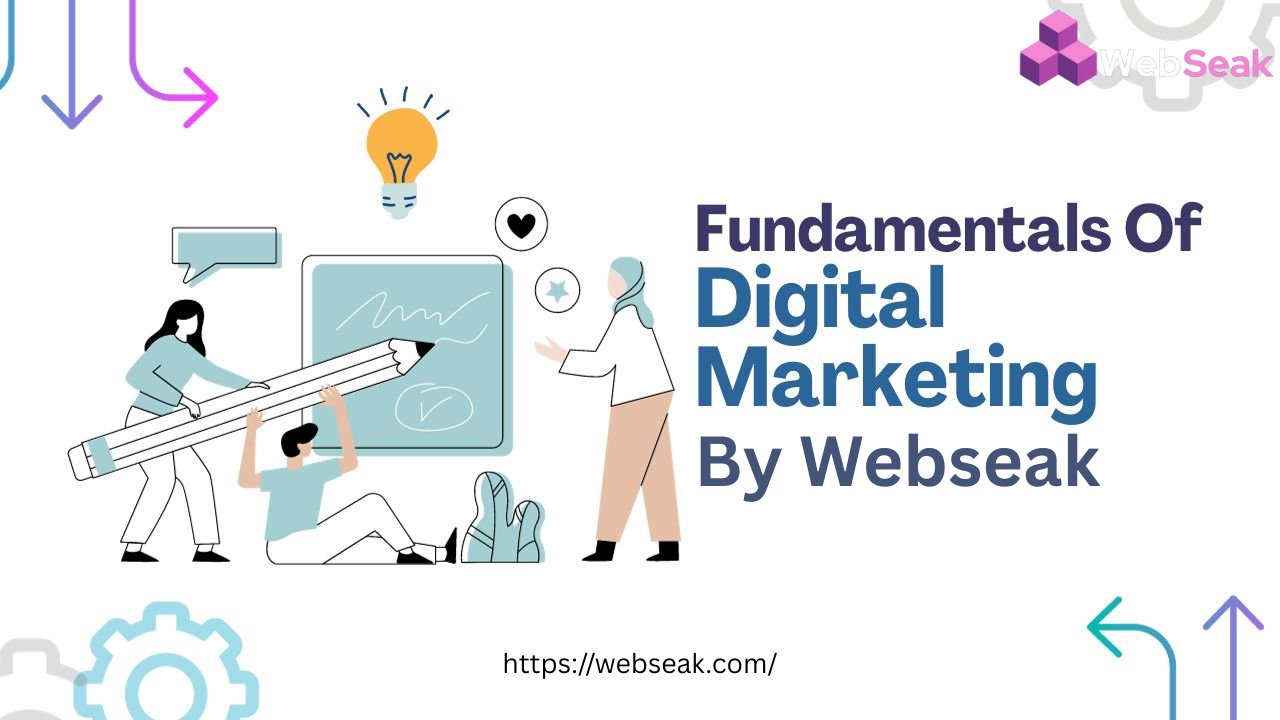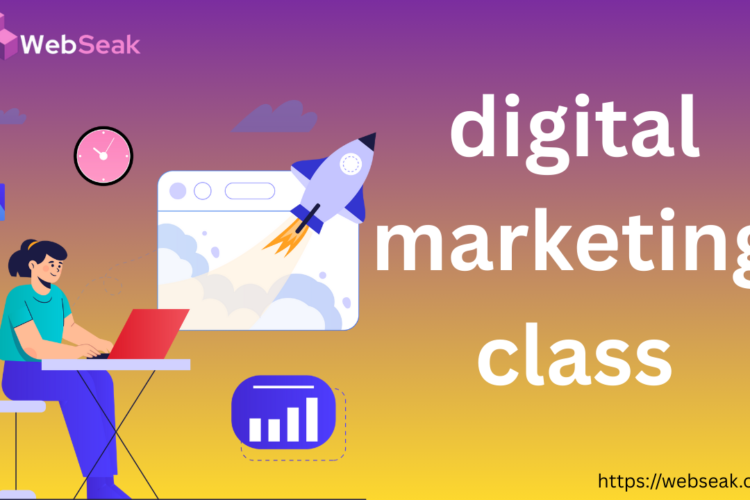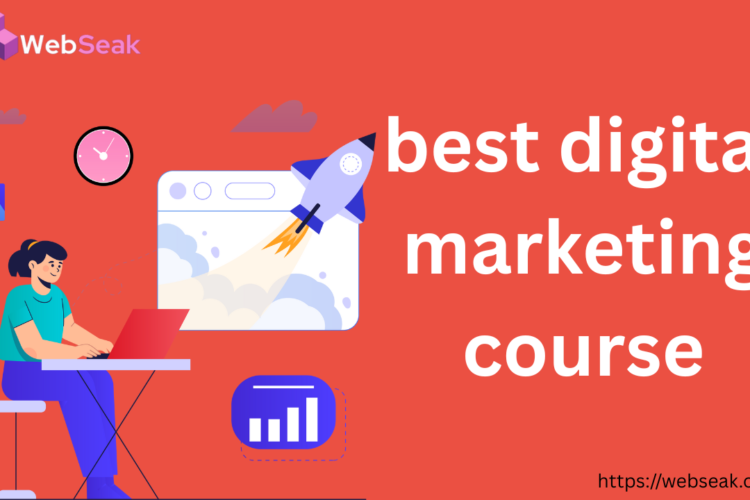
Written by Webseak
In today’s fast paced and tech driven world, digital marketing has become the cornerstone of business growth. Whether you are a new entrepreneur or an experienced brand manager, understanding the fundamentals of digital marketing is essential for building a sustainable online presence and driving measurable results.
Digital marketing is more than just being present on the internet. It is a strategic approach that combines data technology and creativity to attract engage and convert audiences. In this guide by Webseak, we break down the key pillars that make up the digital marketing ecosystem and help you build a solid foundation for long term success.
Table of Contents
What Is Digital Marketing ?
Digital marketing refers to all marketing efforts that use the internet or electronic devices. Businesses leverage digital channels such as search engines websites email and social media to connect with current and prospective customers.
The goal is not just to promote products but to create valuable interactions that guide consumers through their buying journey and foster brand loyalty.
Why Understanding the fundamentals of digital marketing Matters ?
Before diving into tools and tactics, it is important to understand the building blocks of digital marketing. This knowledge enables you to
- Build a data driven strategy
- Reach your target audience more effectively
- Allocate your budget efficiently
- Measure and optimize results
- Stay ahead in a competitive market
Core Fundamentals of Digital Marketing
Let us now explore the essential components that make up the digital marketing landscape
1. Search Engine Optimization SEO
SEO is the process of optimizing your website and content to rank higher on search engine results pages. It improves your visibility to users searching for relevant products or services.
Key aspects of SEO
- On page SEO includes keyword research title tags meta descriptions internal linking and content optimization
- Off page SEO focuses on backlinks social signals and brand mentions
- Technical SEO involves website speed mobile friendliness crawlability and secure connections
A well executed SEO strategy drives organic traffic builds authority and boosts credibility.
2. Content Marketing
Content marketing involves creating valuable and relevant content to attract and engage a target audience. It is not about pushing products but providing information that solves problems or entertains.
Types of content include
- Blog articles
- Infographics
- Case studies
- Videos
- White papers and eBooks
Content should be optimized for both users and search engines. It plays a vital role in SEO and nurturing leads through the sales funnel.
3. Social Media Marketing
Social media platforms like Facebook Instagram LinkedIn X and TikTok are essential channels for digital engagement.
Key elements of social media marketing
- Creating and sharing content regularly
- Engaging with followers
- Running paid advertising campaigns
- Monitoring analytics and performance
A strong social presence increases brand awareness builds community and allows direct interaction with your audience.
4. Email Marketing
Email marketing remains one of the highest ROI channels in digital marketing. It is effective for building relationships nurturing leads and increasing customer retention.
Important email types
- Welcome emails
- Newsletters
- Promotional offers
- Abandoned cart reminders
- Re engagement campaigns
Email campaigns should be personalized segmented and automated for the best results.
5. Pay Per Click Advertising PPC
PPC advertising allows businesses to appear on search engines and platforms through paid placements. You only pay when someone clicks your ad.
Popular platforms
- Google Ads
- Bing Ads
- Facebook and Instagram Ads
- LinkedIn Ads
PPC offers quick visibility and can be highly targeted based on keywords location device demographics and behavior.
6. Analytics and Data Tracking
You cannot improve what you do not measure. Analytics help track performance and provide insights into what is working and what is not.
Common tools include
- Google Analytics
- Google Search Console
- Meta Ads Manager
- HubSpot and other CRM tools
Metrics to monitor
- Traffic sources
- Bounce rate
- Conversion rate
- ROI from campaigns
7. Website Optimization
Your website is your digital storefront. It needs to be fast easy to navigate mobile responsive and designed for conversions.
Core optimization practices
- Clear calls to action
- Easy to read layout
- Fast loading speeds
- Secure HTTPS protocol
- Mobile first design
A well optimized website enhances user experience and increases lead conversion.
Additional Key Areas in Digital Marketing
Besides the core pillars here are other important areas to understand
1. Influencer Marketing
Partnering with individuals who have a loyal audience to promote your product or service organically.
2. Affiliate Marketing
Letting third parties promote your product and paying them commission for each sale or lead they generate.
3. Video Marketing
Using video content for storytelling product demonstrations webinars and social media engagement.
4. Mobile Marketing
Marketing strategies specifically tailored for mobile users including SMS in app ads and mobile friendly websites.
Fundamentals of digital marketing Strategy Tips for Beginners
Here are some beginner friendly tips to help you get started with digital marketing
- Define your goals Clearly outline what you want to achieve such as brand awareness lead generation or sales
- Know your audience Understand who your customers are where they spend time online and what they need
- Start with one or two channels Do not try to do everything at once. Master one or two platforms first
- Create a content calendar Consistent posting helps build trust and keeps your audience engaged
- Use free tools Leverage tools like Google Analytics Google Keyword Planner and Canva to start
- Test and optimize Use A B testing to improve emails ads landing pages and other digital assets
Challenges in Digital Marketing and How to Overcome Them
Digital marketing is not without challenges. These include
- Rapid algorithm changes Stay updated with industry blogs and training
- Content saturation Focus on originality value and storytelling
- Budget constraints Use organic strategies like SEO and content marketing
- Tracking ROI Set up proper analytics tools and track KPIs
With patience creativity and data driven decisions these challenges can be overcome.
Webseak’s Final Thoughts
Digital marketing is an ever evolving field. Mastering in fundamentals of digital marketing is essential for success in any industry. By understanding and applying the principles of SEO content marketing social media and analytics your business can thrive in today’s competitive online world.
At Webseak, we believe in empowering businesses and individuals through education and strategic digital support. Whether you are a solo entrepreneur or part of a larger organization the foundation starts here.
Begin your digital journey with confidence by embracing the fundamentals of digital marketing— and let Webseak be your partner in growth.0


